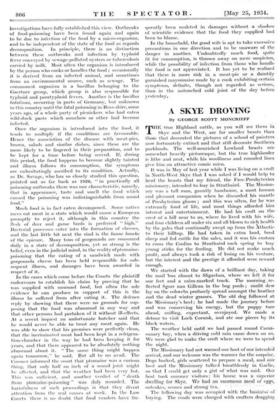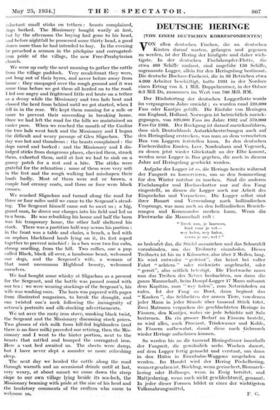A SKYE DROVING
By GEORGE SCOTT MONCRIEFF
THE -true Highland cattle, as you will see them in Skye and the West, are far smaller beasts than those that decorated the pictures of a school of painters now fortunately extinct and that still decorate Southern parklands. The well-nourished Lowland beasts are somewhat heavily picturesque, but the true highlander is lithe and neat, while his woolliness and rounded lines give him an attractive comic mien.
It was in May of last year while I was living on a croft in North-West Skye that I was asked if I would help to herd the beasts that my friend, the .Free-Presbyterian missionary, intended to buy in Strathaird. The Mission- ary was a tall man, gauntly handsome, a most human and pleasant companion when he discarded his mantle of Presbyterian gloom ; and this was often, for he was extremely fond of life, and most things afforded him interest and entertainment. He had his croft on the crest of a hill near to us, where he lived with his wife, and four children all under six and all blown to rich health by the gales that continually swept up from the. Atlantic to their hilltop. He had taken in extra land, bred sheep and fed cattle for the sales, and it was his custom to cross the Coolins to Strathaird each spring to buy young stirks for the feeding. He did not make much profit, and always took a risk of losing on his venture, but the interest and the prestige it afforded were reward enough. We started with the dawn of a brilliant day, taking the mail 'bus almost to Sligachan, where we left it for our feet and a cairn-marked track. The morning re- flected Sgurr nan Gillean in the bog pools ; sunlit dew lay on the cobwebs profusely spread amongst the heather and the dead winter grasses. The old dog -followed at the Misionary's heel ; he had made the journey before and was conserving his energy, but the puppy tore ahead, sniffing, expectant, overjoyed.' We made detour to visit to& Coruisk, and ate our pieces by its black waters.
The weather held:- we had passed round Cania- sunary bay, when a driving cold rain came 'doivn on us. We were glad to make the croft where we were to spend the night. • .. • The Missionary had not warned our host of our intended arrival, and our welcOme was the warmer for the Surprise. Dogs barked, girls scuttered to prepare a meal, and Otir host and the Missionary talked breathlessly in Gaelic, so that I could get only a gist of what was said. OUr host took summer 'visitors ; hiS houSe was a' stiperidr dwelling for Skye. We had an enormous meal of eggs, • oatcakes, .scones and strong tea.. -' " • • The following day was oeeupied with' the iitisiri6ss' of buying. The roads were charged with crofters dragging reluctant small stirks on tethers : beasts complained, dogs barked. The Missionary bought warily at first, but by the afternoon the buying had gone to his head, and before nightfall he possessed some thirty head, a good dozen more than he had intended to buy. In the evening he preached a sermon in the pitchpine and corrugated- iron pride of the village, the new Free-Presbyterian church.
We were up early the next morning to gather the cattle from the village paddock. Very recalcitrant they were, not long out of their byres, and never before away from - home : they rampaged over the rough ground and it was Some time before we got them all herded on to the road. I led one angry and frightened little red brute on a tether as a decoy while the Missionary and two lads beat and chased the herd from behind until we got started, when I fell in in the rear. We kept them running for a mile or more to prevent their succeeding in breaking home. Once we had left the road for the hills we maintained an easier pace. When we reached the mouth of the Coolins the two lads went back and the Missionary and I began the difficult and weary passage of Glen Sligachan. The day was hot and thundrous : the beasts complained : the dogs raced and barked : and the Missionary and I dis- lodged stirks from dangerous places, ehevied them, struck them, exhorted- them, until at last we had to sink on a grassy patch for a rest and a bite. The stirks were grateful for the relaxation ; some of them were very soft in the feet and the rough walking had misshapen their hoofs badly. Most of them were red or brown, a couple had creamy coats, and three or four were black crosses.
We reached Sligachan and turned along the road for three or four miles until we came to the Sergeant's stead- ing. The Sergeant himself came out to meet us ; a big, grand man, he drove our charges into his field and-led us to a barn. He was rebuilding his house and half the barn was his temporary home, the other half sheltered his stock. There was a partition half-way across his portion : in the front was a table and chairs, a bench, a bed with an orphan blackfaced lamb lying on it, its feet roped together to prevent mischief : in a box were two fox cubs, strong smelling, from the hill. Two collies, one a pup called Black, black all over, a handsome beast, welcomed our dogs, and the Sergeant's wife, a 'worrian of that most uncommon Highland beauty, welcomed ourselves.
We had bought some whisky at Sligachan as a present for the Sergeant, and the bottle was passed round with our tea : we were wearing stockings of the Sergeant's, his wife was washing ours. The barn was papered with pages from illustrated magazines, to break the draught, and one twisted one's. neck following the incongruity of actress's portraits and silk-stocking advertisements.
We sat over the rusty, iron stove, smoking black twist, the Sergeant and the Missionary discussing stock prices. Two glasses of rich milk from hill-fed highlanders (and there is no, finer milk) preceded our retiring, then the Mis- sionary and I went to the hinter portion, next to the beasts that rattled and bumped the corrugated iron. Here a vast bed awaited us. The sheets were damp, but I have never slept a sounder or more refreshing sleep.
The next day we herded the cattle along the road through warmth and an occasional drizzle until at last, very weary, at about sunset we came down the steep slope to our own village lying beside its sea-loch, the Missionary beaming with pride at the size of his herd and the laudatory comments of the crofters who came to welcome us,

















































 Previous page
Previous page